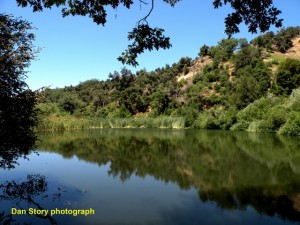Are Nature Religions the Answer to the Earth’s Environmental Problems?
Elements of animism, pantheism, and ancient paganism have recently coalesced in a rapidly growing “new spirituality” movement often referred to by the umbrella term, nature religions. The most familiar forms are several varieties of Neo-druidism, Wicca (witchcraft), and Gaia. Nature religions often blend various religious ideas and practices drawn from a variety of cultural ideologies. Generally, however, all of them are characterized by the belief that the earth is intrinsically sacred and should be revered, and that animals, as well as natural objects (lakes, rivers, mountains, etc.), possess intrinsic value equal to humans. For some earth worshipers, this translates into the entire biosphere being a conscious living entity. Thus, people have no special status or rights in nature and no special privileges beyond that of other creatures. Harming nature in any way is a desecrating act.
One might assume that the pro-environment, ecologically conscious philosophy of nature religions would grant them greater influence in harnessing destructive environmental practices. It hasn’t. In spite their ecological sensitivity and aggressive environmental activism, nature religions have failed to foster an environmental ethos that has broad appeal beyond their own (although growing) inner circle of adherents.
I believe that not only have nature religions failed to curtail environmental abuse (just like the other religions we examined in previous blog articles), but they have also become an impediment to formulating real solutions to environmental abuse and harmful exploitation. Here’s why.
Many Christians and other conservatives have come to associate nature religions with environmentalism, and assume that all environmentalists consider nonhuman life to be as valuable as people. For this reason, many Christians shy away from engaging in pro-environmental activities. For example, a while back a pastor told me he believed the one-world religion allegedly described in Revelation 13:11–18 would not be Islam or some other traditional religion, but environmentalism. Although I strongly disagreed with this view, it illustrates the widespread assumption among Christians that pagan nature religions are intrinsic to environmentalism.
The fact is the ecological philosophy of nature religions—that nature must be preserved for its “intrinsic worth” without considering human priorities—is not a viable option for reaching long-term conservation goals. And many environmental organizations realize this. People are more likely to endorse and participate in conservation activities if protecting nature and the environment is inclusive of human requirements. Human welfare must come first.
This has been my experience during my years of activism in the emerging environmental movement of the 1970s and 1980s. I never met anyone who worshiped nature or believed that animals and natural objects are as valuable as people. I’m not saying extremist do not exist in environmental organizations—and probably more so today with the growing popularity of nature religions—but the majority of Americans simply love outdoor activities and merely want to enjoy nature, set aside unique natural habitats, prevent the extinction of wildlife, and manage natural resources in an environmentally sensitive fashion. I’m sure few Christians would object to these goals.
It should be obvious by now that any concerns for nonhuman life and natural objects present in animistic tribal religions (blogs 5, 6, & 7), Eastern religions (blogs 8 & 9), and nature religions are not ethical principles designed to protect nature and its creatures for their own sake—and out of obedience to God. In the case of tribal religions, it’s a byproduct of appeasing a hostile spirit world that supposedly permeates nature. Eastern religion’s so-called compassion for nature is equally human-centered. If ahimsa and the law of karma instruct followers to avoid harming other animals, the purpose is to aid people in achieving eternal bliss—not to protect wildlife for wildlife’s sake. The Buddhist teaching that practitioners should deny self and control consumption is not designed to conserve natural resources; it’s to aid one in achieving Nirvana by removing cravings. In nature religions, deifying nature does serve human needs because people are considered no more important than nature. In all three religious ideologies, there is no accountability to a transcendent divine Authority and thus no objective foundation on which to establish environmental ethics.
Biblical Christianity, on the other hand, reveals that the natural world is the creation of a loving Supreme Being who is concerned about its welfare. Biblical Christianity recognizes that mankind possesses distinct stewardship responsibilities over creation according to a divine plan. Biblical Christianity provides the moral principles needed to establish environmental ethics and to provide guidance for environmental stewardship.
Demonstrating these facts will be the subject of the remaining weekly articles in this blog series. ©
* The blog articles in this series are adapted from my book Should Christians Be Environmentalists?, published by Kregel Publications in 2012. The blog articles do not contain all the chapters, data, quotes, references, or my personal experiences, which the book includes. So, for “the rest of the story” you will need to purchase the book, which is available in both paperback and Kindle. This and the following articles are copyrighted material and may not be reproduced in book or article form. But feel free to send links to these articles to your personal email list, Facebook friends and groups, Twitter followers, or other people who may enjoy them. I encourage interested reader to subscribe to my blog or request to be added to my personal email list. This will ensure that you receive notices whenever I post a new blog article or other ministry related materials.
